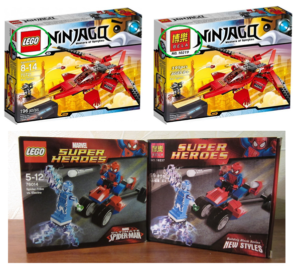Chinese courts give Lego a leg-up in IP disputes
Written by Éamon Chawke | December 14, 2017
Play well!
“LEGO” is a line of plastic interlocking bricks and toys manufactured by the Lego Group (a privately held company based in Denmark). The Lego Group began manufacturing Lego bricks in 1949 and since then a global Lego subculture has developed (movies, games, competitions and six Legoland amusement parks have since been developed under the Lego brand).
In February 2015, Lego replaced Ferrari as Brand Finance’s “world’s most powerful brand” and as of July 2015 600 billion Lego parts have been produced.
The word Lego is derived from the Danish “leg godt” meaning “play well”.
LEGO vs BELA
Lego has recently won a landmark case in China against two companies that were manufacturing and selling rival products, which were almost identical to Lego products, under the “BELA” brand name and logo.
 The China Shantou Intermediate People’s Court had found that the Bela products infringed certain copyrights owned by the Lego Group, and that the manufacturing and selling of the Bela products constituted acts of unfair competition. The court also found that Lego is protected under Chinese anti-unfair competition law because of its distinctive and unique appearance.
The China Shantou Intermediate People’s Court had found that the Bela products infringed certain copyrights owned by the Lego Group, and that the manufacturing and selling of the Bela products constituted acts of unfair competition. The court also found that Lego is protected under Chinese anti-unfair competition law because of its distinctive and unique appearance.
It is the first time that Lego has succeeded in a copyright case in China, where the manufacturing and selling of unauthorised copies of its colourful bricks and figures has been a recurrent problem.
Earlier in the year, the Beijing Higher Court had already passed a ruling recognising that the Lego name and logo were well-known trade marks in China, which put Lego in a stronger position to take action against copycats.
Result!
As a result of the rulings, the two Chinese companies that were manufacturing the rival copycat products must change their logos and packaging.
Briffa comment
There are a number of important points to take away from the Lego vs Bela intellectual property dispute:
First, identifying all available intellectual property rights is an essential first step.
All too often clients fail to adequately protect themselves, their brands and their products from copycats and unfair competition, primarily because they do not identify all forms available intellectual property protection at the outset. For example, trade mark protection may be available for a range of ‘brand identifiers’ including names (e.g. the word ‘LEGO’), logos (e.g. the well-known red, yellow, black and white Lego logo), shapes (e.g. EUTM no. 000050518 protecting the distinctive shape of the ‘Lego man’), taglines, colours and sounds. Copyright protection may be available for a range of original designs, artwork (e.g. logos, adverts, photos, packaging etc.) and other creative works (e.g. videogames and movies). Registered and unregistered design protection may also be available for a range of new shapes and designs. In many cases, copycats will take certain elements from the original product or brand in an attempt to emulate that original without exposing themselves to a claim for intellectual property infringement (e.g. the copycat might copy the name or the logo under which the product is sold, but not the product itself (or vice versa)). In order put themselves in the strongest possible position to combat infringement, clients should speak to an intellectual property specialist as early as possible and seek to identify (and obtain – see below) as many types of intellectual property protection as possible so that they have a menu of options to choose from in any infringement scenario.
Second, securing all available intellectual property rights is an essential second step.
Knowing that different forms of intellectual property protection are available is one thing. Acquiring those different forms of protection, and having them in the arsenal when infringement is discovered, is quite another. Some types of intellectual property require registration (e.g. patents, trade marks and registered designs). Other types of intellectual property are not registrable in certain jurisdictions and require the author/creator of the copyright work to provide evidence of creation if they are to rely on the right in an infringement scenario. Some types of intellectual property may be lost after a period of time or the right may become more difficult to acquire over time (e.g. designs that are registered too long after they are first disclosed to the public are vulnerable to cancellation for lack of novelty). In addition, certain causes of action relating to the unauthorised use of intellectual property protection may also be available (such as passing off, unfair competition or unauthorised use of confidential information). Clients who wish to maximise their intellectual property protection should always seek advice from an intellectual property specialist as early as possible (and ideally before new brand names, logos, products etc.) are disclosed to the public (so that the steps necessary to obtain intellectual property protection can be undertaken in advance).
Third, the attitude to intellectual property protection in China has changed.
Counterfeiting and other types of intellectual property infringement have unfortunately been a common phenomenon in certain territories (including China). For that reason, some clients have traditionally taken the view that it was not worth spending time and money pursing intellectual property protection in certain territories because it would always be costly, time-consuming and cumbersome to enforce their rights. However, there has clearly been a sea-change in China in the last number of years in relation to intellectual property protection (as evidenced by the Lego judgements) and, accordingly, clients who manufacture their products in China and/or make their products available for sale on the Chinese market should give serious consideration to obtaining appropriate protection for their intellectual property in that territory if they are to be in a position to combat copycats and other infringers.
Briffa advises its clients on all aspects of contentious and non-contentious intellectual property law and practice. If you would like to arrange a free call or a free meeting with one of our specialist intellectual property lawyers, please do not hesitate to drop us an email at info@briffa.com or give us a call on 020 7096 2779.

